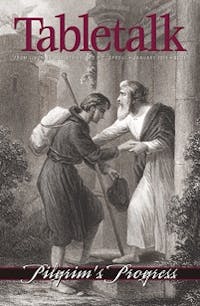
Request your free, three-month trial to Tabletalk magazine. You’ll receive the print issue monthly and gain immediate digital access to decades of archives. This trial is risk-free. No credit card required.
Try Tabletalk NowAlready receive Tabletalk magazine every month?
Verify your email address to gain unlimited access.
It has been said that one hallmark of the Puritan view of the Christian life was the emphasis placed on being “constant” (or being steady and unchanging). Remember how John Bunyan puts the challenge to us to learn from the life of the pilgrim?
Who would true valour see, let him come hither; one here will constant be, come wind, come weather. There’s no discouragement shall make him once relent his first avowed intent to be a pilgrim.
That is, “if you want to know how to live a constant Christian life, come take a look at this guy.”
The Puritans, and certainly Bunyan, highly valued the Bible’s accent on faithfully, consistently, tirelessly pursuing the Christian life with a view to the long haul. Key to this is the role of the ordinary means of grace (chief among them the reading/preaching of the Word, the right partaking of the sacraments, the engagement of the soul with God in prayer). If we are to manifest the constancy of the Christian pilgrim’s life then we will also place much stock in the ordinary means of grace.
The Word, sacraments, and prayer — these are the ordinances given by God with which spiritual life is nurtured. By “ordinances” we mean spiritual instruments of grace and growth in grace appointed by God in the Bible. Here’s how the Westminster Assembly explained this in their Shorter Catechism, Question 88: “What are the outward and ordinary means whereby Christ communicates to us the benefits of redemption? Answer: The outward and ordinary means whereby Christ communicates to us the benefits of redemption are, his ordinances, especially the Word, sacraments, and prayer; all which are made effectual to the elect for salvation.”
How does one go about living the Christian life? How does one walk in the way of salvation? How does one become a “constant Christian?” By a careful use of God’s appointed, ordinary and outward means of growth. Again, the assembly of divines gives this helpful summation of the Bible’s answer: by “faith in Jesus Christ, repentance unto life, with the diligent use of all the outward means whereby Christ communicates to us the benefits of redemption.” In other words, the constant Christian is strengthened for his pilgrimage by God’s grace held out to all who trust in Christ, bestowed and received through the ordinary means set forth in the Word.
So, when we say that the Christian pilgrim highly values God’s ordinances and faithfully participates in the ordinary means of grace, we mean that the pilgrim believes the things that God says in the Bible are central to the spiritual health and growth of His people, are in fact central in his own Christian life. In other words, if God says in the Bible that the way His people grow is by a diligent use of His ordinary means, a true pilgrim believes God and lives accordingly.
Thus, pilgrims (in order to know and grow in the true knowledge of God, and to keep fast in the way of faithfulness) delight in, highly value, and faithfully attend the public reading and preaching of the Word; mature in their assurance as they contemplate God’s saving promises to them each time they see baptism administered and joyfully commune in the Lord’s Supper; and engage in a life of prayer, especially expressed corporately in the local church.
This isn’t just a Puritan thing though. It is a biblical thing. Throughout the New Testament, God explicitly instructs pastors and churches to do the following things: First, “Give attention to the public reading of Scripture, to exhortation and teaching” (1 Tim. 3:13 NASB); Second, “Preach the word; be ready in season and out of season; reprove, rebuke, exhort, with great patience and instruction” (2 Tim. 4:2 NASB); Third, “Make disciples of all the nations, baptizing them in the name of the Father and the Son and the Holy Spirit, teaching them to observe all that I commanded you” (Matt. 28:19–20 NASB); Fourth, “This is My body, which is for you.… This cup is the new covenant in My blood; do this, as often as you drink it, in remembrance of Me. For as often as you eat this bread and drink the cup, you proclaim the Lord’s death until He comes” (1 Cor. 11:24–26 NASB); Fifth, “I urge that entreaties and prayers, petitions and thanksgivings, be made…. Therefore I want the men in every place to pray, lifting up holy hands” (1 Tim. 2:1, 8 NASB).
These are the main ways God’s people grow and become constant. We are saved by grace through faith — indeed, by grace alone through faith alone in Christ alone. But the means of God’s grace to bring us to faith and grow us in grace are the Word, prayer, and the sacraments. Nothing else we do in the church’s program should detract from these central means of grace; indeed, everything else we do should promote and coalesce with them. Nothing else is more important if we are to display the constancy of the pilgrim life.
Walk this way, and you’ll be constant, come wind or weather.
